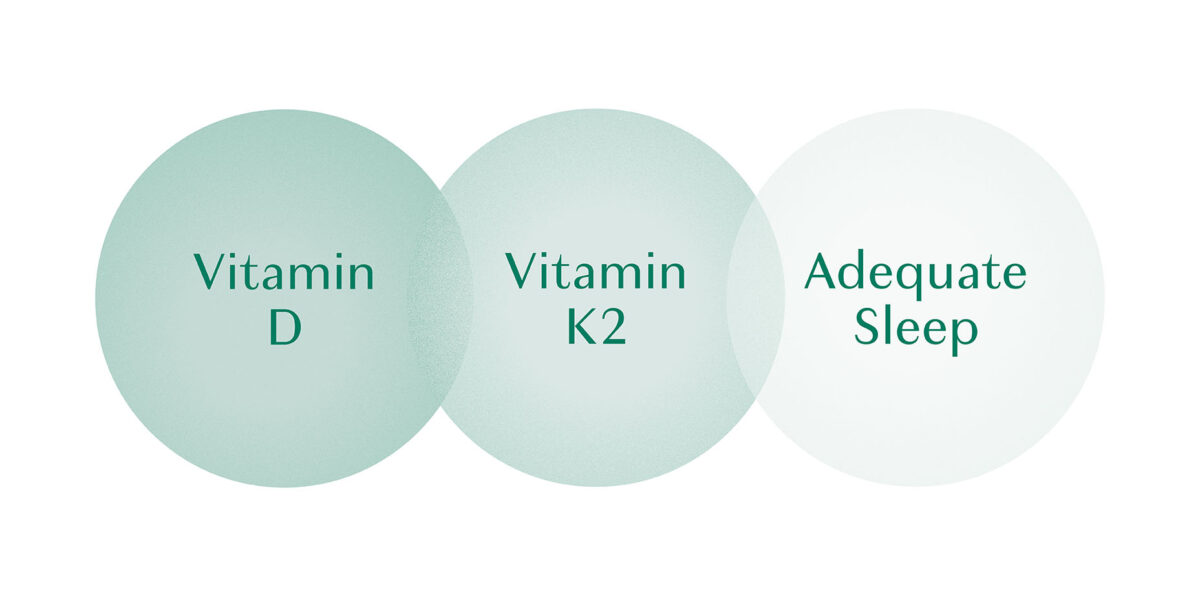Did you know that low bone mineral density is an early indicator of increased risk for Alzheimer’s disease? You may not have heard about this in the headlines, but ongoing research continues to show a strong link between these two conditions [1].
In fact, in a recently published prospective study, investigators found that low bone mineral density at the femoral neck was associated with a 52% increased risk of developing Alzheimer’s disease in a ten-year follow-up [2].
Could it just be age taking a toll? While this sounds like an easy explanation, research shows that the connection between bone health and brain health is much more complex.
Read on for an exploration of the connection between bone and brain health. We’re going to get to the core of the underlying pathologies, and provide some simple solutions for keeping both your brain and your bones healthy for years to come.
The Connection Between Bone and Brain Health
While osteoporosis and Alzheimer’s disease appear to be two completely different conditions, we’re now learning that the same underlying pathological mechanisms are shared by and drive both.
What exactly are these mechanisms?
Put simply; it’s the production of beta-amyloid plaques which occur when beta-amyloid proteins clump together. You’ve likely heard this term referenced regarding Alzheimer’s disease, but what we’re now discovering is that these unwanted plaques take place not only in your brain but in your bones.
In your brain, neurotoxic plaques accumulate in areas that control your ability to think, remember and use language. They literally gum up the works, gradually destroying your access to memories, thinking, organizing, and social skills.
In your bones, the release of beta-amyloid proteins results in skeletal amyloidosis, which ramps up the activity of bone-resorbing cells (osteoclasts), resulting in increased bone loss [1][3].
Now here’s the good news; the same factors that promote beta-amyloid production in your brain are responsible for promoting beta-amyloid production in your bones. Why is this good?
Because these underlying factors are both correctable and can be managed in a safe and natural way.
In fact, if you’re already caring for your bones with targeted nutrients, it’s likely that you’re way ahead of the curve on this one.
How To Protect Your Bones and Your Brain
Interestingly, two nutrients and one healthy habit commonly associated with bone health are also crucial for protecting your brain and bones against amyloid plaques.
Let’s dive into the details.

Vitamin D
In addition to its well-established beneficial effects on bone metabolism, muscle growth, strength and regeneration, and immune function, vitamin D also plays a pivotal role in both the normal function and protection of the central nervous system: the brain and spinal cord [4][5][6][7].
In essence, vitamin D’s actions in your brain can be categorized as direct, immune, and homeostatic.
Direct effects of vitamin D [1][8][9]:
- Vitamin D inhibits the production of nitric oxide in your brain, which supports brain health as nitric oxide can go on to form a highly damaging free radical called peroxynitrite.
- Vitamin D helps protect neurons from free radicals by increasing levels of the body’s most powerful antioxidant, glutathione.
- Vitamin D also directly supports the growth, maintenance, proliferation, and survival of brain cells.
Immune actions of vitamin D [10] :
- In your brain cells, vitamin D stimulates the activity of the innate immune system. Specifically, vitamin D increases the number and activity of macrophages, a type of white blood cell that phagocytizes (gobbles up) beta-amyloid.
- Particularly when combined with curcuminoids and the omega-3s, EPA, and DHA, vitamin D protects against beta-amyloid formation and aggregation.
- Vitamin D plays an important role in maintaining “calcium homeostasis,” or healthy levels of calcium in the brain, by upregulating calcium channels and the synthesis of calcium-binding proteins. In doing so, vitamin D prevents increases in the intracellular concentration of free calcium within our brain cells, which can impair neuron function and eventually lead to cell death.
Research also suggests that taking vitamin D supplements may increase the production of vitamin D-binding protein [11].
In addition to transporting vitamin D in the bloodstream, vitamin D binding protein has another vital role in the brain where it directly interacts with beta-amyloid and inhibits its aggregation.
If you haven’t had your vitamin D levels checked recently, it’s a good idea to test them at least once a year, preferably twice. If you find that you aren’t within the optimal range, it would be a good idea to spend time in the sun, eat more vitamin D-rich foods, or take a vitamin D supplement.
Vitamin K2
Vitamin K2 is a crucial nutrient that protects against osteoporosis due to its involvement in the activation of two proteins, osteocalcin and matrix Gla protein, which help to regulate the body’s healthful use of calcium.
However, there’s another health-essential protein that requires vitamin K2 that you likely haven’t heard about: Gas 6.
Gas 6 and its receptors are widely distributed throughout your brain and spinal cord, which gives us insight into how important this protein is for healthy brain function. In cell studies of rat neurons, the binding of Gas 6 to its receptor prevented beta-amyloid from triggering apoptosis (cell death), indicating a protective role of vitamin K2 in the brain [12].
Furthermore, vitamin K2 is involved in the synthesis of sphingolipids, which participate in the proliferation, differentiation, and survival of brain cells.
Sphingolipids are an essential part of the myelin sheath and the cell membrane of your neurons, where they support cell structure as well as improve your brain cells’ ability to respond to and transmit signals [13].
Changes in the production of sphingolipids promote neuroinflammation and neurodegeneration and are considered an early marker of Alzheimer’s disease [14].
By enhancing the production and health of sphingolipids, vitamin K2 may help to protect your brain against neurodegeneration [15].
If your genetic inheritance includes Apolipoprotein E4 (APOE4), then ensuring optimal levels of vitamin K2 is especially important.
Apolipoprotein E (APOE) is a protein that binds to fat-containing lipoproteins, like cholesterol, and affects how rapidly cholesterol, and thus the vitamin K it contains, is degraded in the central nervous system (the brain and spinal cord) and systemic circulation.
APOE comes in three versions: APOE2, APOE3, and APOE4. APOE2 is considered protective. APOE3, the version most of us carry, is middle of the road, not especially protective but not pro-inflammatory. If you’ve inherited the APOE4 version, however, you’ll tend to be more at risk of systemic inflammation, plus you’ll remove vitamin K-rich lipoproteins from your bloodstream and brain more quickly than average and will therefore need more vitamin K2.
This is why APOE4 is a well-established risk factor for both Alzheimer’s disease and fragility fractures [16][17].
Vitamin K2 can be difficult to get in protective amounts through diet, and most dietary sources provide MK-4, not MK-7 (which is a longer-lived form you really want for bone health). The only exception is natto, a Japanese food made from fermented soybeans that is rich in MK-7. For this reason, to ensure you’re not low in vitamin K2, your best bet is to get it through a high-quality supplement.
Adequate Sleep
Research shows that not getting enough quality sleep directly impacts bone remodeling [18], and it may increase beta-amyloid accumulation [19] as well as may increase the risk of dementia by 30% [20].
For tips on how to get a good night’s sleep, including ways to naturally increase production of the sleep hormone, melatonin, check out my article on Sleep and Bone Health.

Takeaway
If you’re concerned about the health of your bones and your brain, I hope that this information gives you some peace of mind. When you care for your bones, you care for your brain – and vice versa.
By getting the proper nutrients and a good night’s rest, you can get ahead of potential issues that come with aging. Vitamin D and vitamin K2 are rock stars for both brain and bone health and help support your overall health. Make sure to get plenty of time in the sun, enjoy foods rich in these nutrients, and as needed, top it all up with good quality supplements.
For more information and tips regarding all things bone health and longevity, sign up for the AlgaeCal Newsletter.
FAQs
Does osteoporosis affect your brain?
There’s a strong correlation between osteoporosis and cognitive impairment due to overlapping factors that instigate both conditions. This includes the production of amyloid plaques in both the brain and the bones.
What is the best nutrient for the brain?
Your brain requires several nutrients to function optimally, including vitamin D, vitamin K2, omega-3 fatty acids, melatonin, and B vitamins.
Is vitamin D good for the brain?
Adequate levels of vitamin D are associated with better cognitive function and may protect against amyloid plaques and Alzheimer’s disease.
Does melatonin help with calcium absorption?
By mediating the secretion of thyroxine and calcitonin, melatonin may increase calcium absorption and utilization in the body.





Shirley sanderson
October 8, 2023 , 9:34 amAmazing. I am switching to this product. Have osteoporosis & working on corrections. I am expecting!!